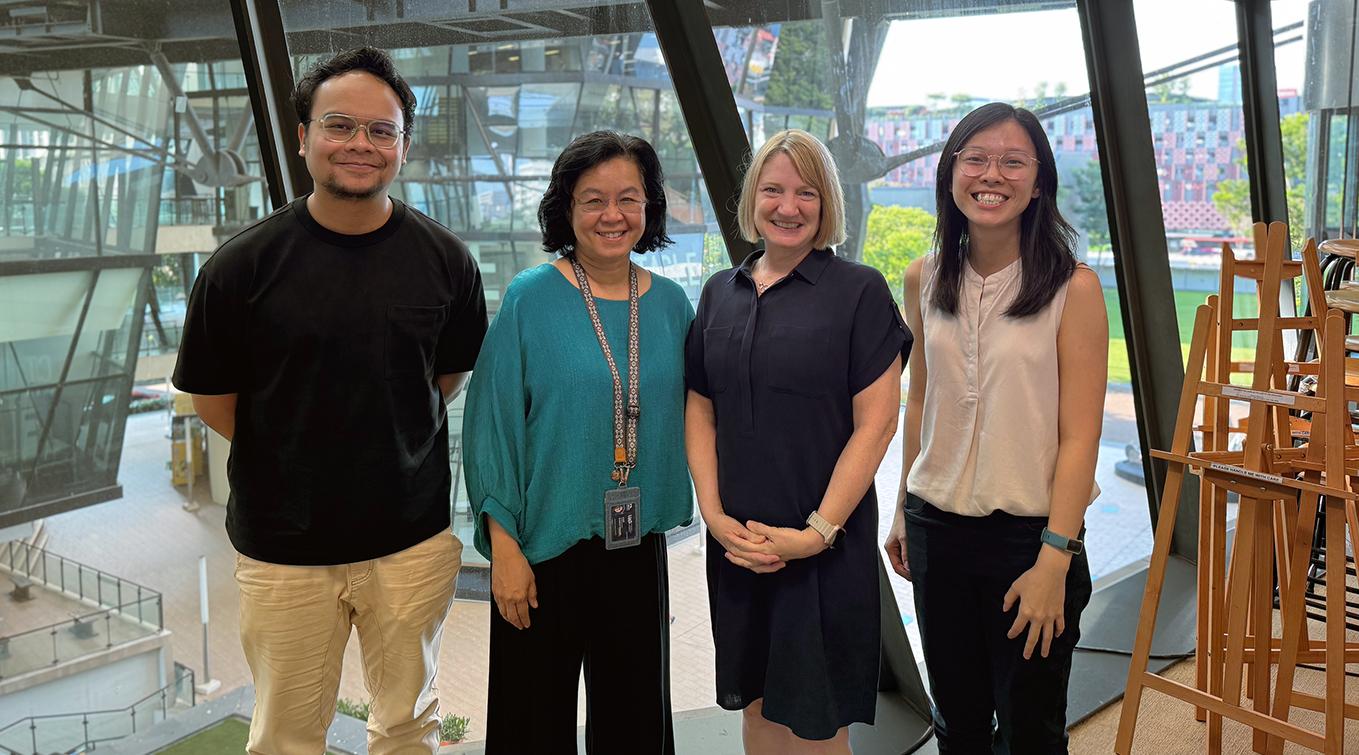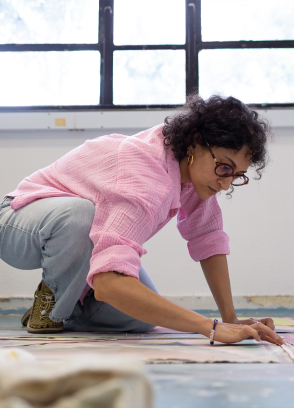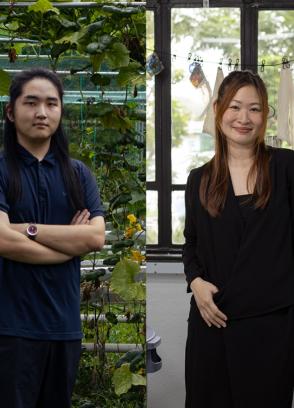From left: MA Music Therapy student Bakti Khair, Programme Leader Dr Indra Selvarajah, visiting artist Dr Lori Gooding and MA Music Therapy student Joycelyn Sim.
This interview was conducted by MA Music Therapy students Bakti Khair and Joycelyn Sim, and has been condensed and edited for clarity.
Before the inception of LASALLE’s MA Music Therapy programme in 2024, many of Singapore’s practising music therapists had to train abroad. However, as lecturer Eta Lauw highlighted in a recent Straits Times feature, “There are a lot of very specific cultural elements to [music therapy],” pushing music therapists who studied overseas to make significant adaptations for their training to fit Singapore’s context.
With LASALLE’s MA Music Therapy programme, students are now able to learn within a local context, complete clinical placements and observe how music therapy is practised here, which opens up opportunities to develop research, advocacy and discourse specific to the Singaporean context.
Says Programme Leader Dr Indra Selvarajah, “We know that in Singapore, music therapy is fast growing and there's a lot of interest. We also understand the urgency to be able to communicate the benefits of music therapy.
“So we need to be able to have discussions about what serves Singapore's purposes best, how we define what constitutes evidence of music therapy's benefits, and how this impact can inform our clinical practice and improve the way we serve our clients and our community.”
So we need to be able to have discussions about what serves Singapore's purposes best, how we define what constitutes evidence of music therapy's benefits, and how this impact can inform our clinical practice and improve the way we serve our clients and our community.”
– Dr Indra Selvarajah
As part of efforts to promote such conversations and demystify music therapy through the lens of evidence-based and practice-based integration, the programme organised the one-day conference Resonating Realities: Music therapy as evidence-based practice, featuring as its keynote speaker Associate Professor Dr Lori Gooding, immediate past president of the American Music Therapy Association (AMTA), Director of Music Therapy at the Florida State University’s College of Music, and Fulbright Specialist.
Prior to the conference, Dr Gooding sat down with Bakti Khair and Joycelyn Sim from the pioneering MA Music Therapy cohort to discuss what she thinks constitutes music therapy, the connections between music education and music therapy, and how to ‘build a box’ before you can even start to ‘think outside the box’.
What is music therapy to you?
You know, I thought about this a lot. I talk about it with my students all the time, because I think how we define music therapy is so important, because it helps other people understand what we do.
I've changed how I think about it across time, but some of the core things that keep coming up for me over and over is that music therapy is a profession that involves a relationship between people. It involves purposeful and intentional use of music, and our goal is to improve function. Sometimes that means increasing things. Sometimes that means decreasing things. Sometimes that means helping people learn new things.
But my goal is always to build relationships with my clients through music, to use music to address their needs, help them with their functional outcomes, and also improve their functioning in whatever way that works for them and speaks to their own preferences, cultural background and values.
[...] music therapy is a profession that involves a relationship between people. It involves purposeful and intentional use of music, and our goal is to improve function. Sometimes that means increasing things. Sometimes that means decreasing things. Sometimes that means helping people learn new things."
Music education and music therapy are sometimes talked about in conjunction with each other. How has having a background in both fields helped you in the work that you are doing?
I think that having a background in music education has been incredibly useful. As a music educator, I learned how to plan, manage time, work with groups, motivate people and manage behaviors—all of the things that you need to be able to do as a music therapist.
So I think that's also been helpful in the way that I think about music therapy—that music therapists at their core are actually teaching people how to do things. Not in every session, of course, but in many of them. You're not necessarily teaching them how to play the clarinet or the piano, or how to read music, but you're teaching them how to cope, manage their emotions or walk again. You're using music to teach these really important life skills.
And so the teaching aspect has really helped me to think about how to best convey information to someone, which they then can then use to develop a new skill or relearn an old one, or manage something in a way that's different from how they've typically done in the past. This ability to break down concepts and then explain it to others in ways that work for them was really informed by music education.
That's awesome. Because both of us were previously educators, we have been able to draw a few parallels as well, like how teaching also helps us to be attuned to emotions when dealing with a number of people in front of us
Yes, you get great observation skills. As a music educator, you really have to learn how to observe people—are they struggling, are they coping—and also managing and figuring out what works best for each student. And I think that you could definitely bring that into music therapy because a lot of it involves nonverbal communication.

Having been in the field for a long time, do you have any special memories from working with clients?
So one of my favorite clinical memories is a young patient around six or seven years old, and they had recently been diagnosed with brain cancer. When we first started working with them, the only thing that this child could do was blink, because they had undergone surgery which had impacted their cognitive, neurological functioning.
So we started by asking the child what song they wanted and to blink with the song. Because recovering from brain surgery is a huge undertaking, we worked with this particular child for months. Slowly, we went from communicating through blinking to placing a hand over theirs, holding their hand and helping them play.
There was a day right before they were discharged that I opened the door and stuck my head in and said, “Hey, are you ready for music therapy?” And they got up out of the chair, came running to me and gave me a big hug—and this was a child that initially could only blink.
It wasn't all just because of music therapy—there were so many healthcare providers that were caring for this child—but to know that what we had done as music therapists was part of that, was really, really incredible. It was amazing to be able to help her with recovery.
What keeps you going in the profession?
As an educator, I really enjoy being able to teach other people how to do this thing called music therapy, because I know that they are going to go out and have their own formative child-with-a-brain-tumor-type experiences.
Maybe it’s not with a child who has a brain tumor, maybe it’s with an older adult who has dementia. Or maybe it’s with a family who is struggling to reconcile while their family member is dying. It may even be with a walk-in client.
Every time that I work with a group of students, I’m helping them find what matters to them, so that they are able then to go out and help people in a specific population or setting, which will in turn accomplish the goals that they had aspired towards. That's a really powerful thing to me—to be able to teach you all the things that you need to know in order to be able to go out and have those kinds of experiences.
Because music therapy is still a growing field in Singapore, do you have advice for how we should go about advocating for the field and our profession?
I think one of the most important things to do when you're trying to develop opportunities in any population or setting, is grounding advocacy in research and training. If you design your clinical work in ways that are similar to research, you actually already have information you can pull from to do research, or it becomes very easy to integrate a research project.
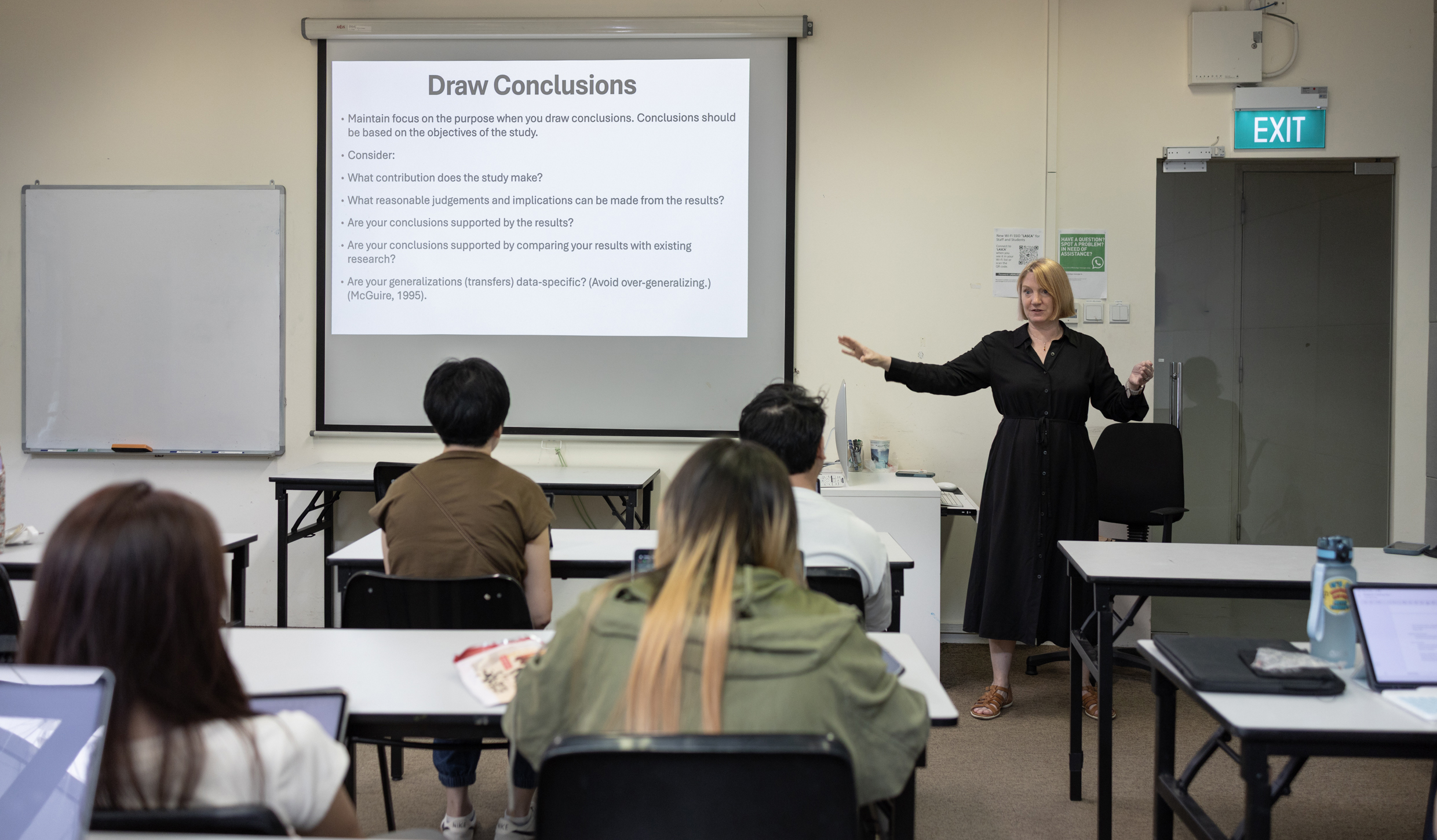
But I think advocacy is also about relationships—building connections, reaching out and making contacts. It can come from attending education conferences and presenting about music therapy, or meeting with administrators. It can come from trying to create a programme and running it as a pilot to start and see how music therapy can work in that setting.
Because music therapy is a hard concept for people to understand until they see it. Even when we explain it well, it still can be hard for others to wrap their heads around it. But it often helps administrators and policymakers to see music therapy in their context or setting, because when they see you doing something that's helping a population, that's when it becomes real and powerful.
So we have to think not just of advocacy, but also education. They’re two sides of the same coin.
What are some future developments that you see coming out of the profession?
Well, if the COVID-19 pandemic taught us anything, it was that technology is part of music therapy and its future. Technology has allowed us to better meet the needs of the people we serve. Therapy is more accessible because people don't have to commute, or because they're more comfortable getting services from home, where it's more private. Whether it's because technology helps clients communicate with us, or that format just works better for them, it has enabled us to be more effective.
I think there's a lot of possibility in Singapore for advances in music therapy to happen, because of what the country offers in terms of technology and healthcare. As someone on the outside looking in, some of the leading practices are coming out of Singapore and there's a lot of opportunity to really move music therapy forward—not just in Singapore, but also globally—because of the unique opportunities you have here.
Do you have any advice for us, music therapy students, who are about to venture into this profession?
One of the things that I like to talk to my students about is the phrase that goes "think outside of the box". But in order to think outside of a box, you have to have a box. All of the skills that you're building, all the tools that you're developing, all the experiences that you are undergoing—think of these as your foundation, which is your box.
When you have a foundation for practice, it allows you to do whatever you want with the box. You can turn it upside down. You can stand on it. You can sit on it. You can open it up and put more stuff in, or you can decide you don't want it, put it in the corner of the room and do something else.
But if you don't build your box, you can't turn that box into all of these different opportunities. So I think the best thing that you can do as students is to really build your box. Look for all the opportunities you can find. Look for ways to get new experiences, learn new information, talk to new music therapists, connect with the Singaporean community and the global community—because all of that gives you more for your box, and then you can do whatever you want as you move forward.
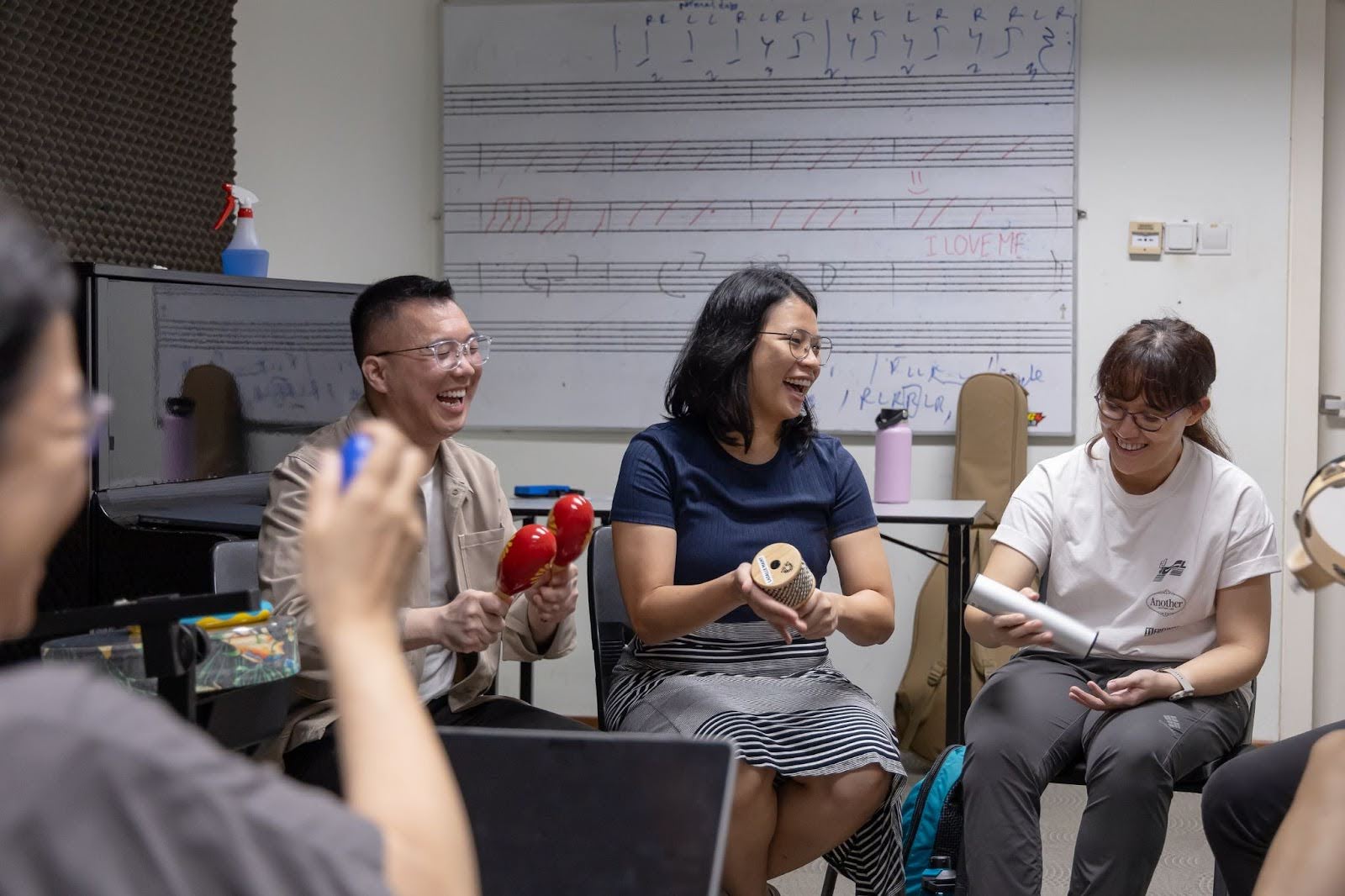
Apply now for our postgraduate programmes.

